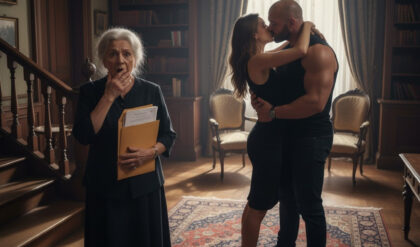
Honestly, I can’t believe I ever lowered myself enough to marry you. You were never, and will never be, anywhere near my level.”

My husband, Ryan, said those exact words to me on a Tuesday night in October. I stood in our dining room, wearing the dress I had chosen to celebrate my Teacher of the Year award. He had come home three hours late to the special dinner I’d prepared, barely glanced at the table set with our wedding china and flickering candles, and delivered what he clearly considered an overdue correction to our marriage.
“From now on,” he’d continued, his voice as cold and clinical as a legal brief, “I’ll decide when we talk or spend time together. Stop chasing me like a desperate puppy.”
He compared our salaries as if human worth could be measured on a spreadsheet—my forty-eight thousand dollars as a second-grade teacher against his upcoming partnership at a prestigious law firm—and declared we were not equals. Then he walked past me into his office and closed the door, leaving me standing alone with the cold salmon and dying candles.
I did not cry. I did not beg or knock on that door demanding answers. Instead, I felt something cold and clear settle inside me, like ice forming on a winter lake. If my husband wanted silence and distance, if he truly believed marrying me had been “lowering himself,” then I would give him exactly what he asked for. I would give it to him with such perfect, unwavering compliance that two weeks later, he would be standing in my school lobby holding roses and begging for the woman he thought he had broken.
The cruelty of that night did not appear out of nowhere. It had been building for months, a slow accumulation of small cuts I kept making excuses for, until they formed a wound I could no longer ignore.
I had spent the entire afternoon preparing that dinner. The salmon was pan-seared exactly the way Ryan’s mother had taught me during those early months when she still pretended I was good enough for her son. The asparagus was roasted with just the right amount of olive oil and sea salt. I’d driven to three different stores to find the specific Cabernet he preferred, the kind that cost forty dollars a bottle and represented a significant portion of my weekly grocery budget. I set out the wedding china we kept for special occasions, gifts from relatives who believed they were investing in a lasting marriage. The candles were the expensive kind that burned cleanly, arranged in crystal holders we had registered for but rarely used.
This dinner was supposed to mean something. After six years of teaching second grade, pouring my heart into helping seven-year-olds learn to read and write, I had been selected as Teacher of the Year for my school. The recognition came with a small bonus I’d already mentally allocated toward the student loans I was still paying off—the loans I had taken out to support us through Ryan’s final year of law school, when I worked two jobs to keep us afloat. More than the money, the award was validation that my work mattered. I wanted to share that moment with my husband. I wanted him to look at me the way he used to, when he’d introduce me at firm events with his hand on the small of my back and tell his colleagues I was the best thing that had ever happened to him.
Six-thirty came and went. Seven o’clock passed, then eight. The salmon was losing its perfect texture in the oven. The candles had burned down an inch. I texted him twice, asking if everything was okay. No response.
By nine, I had moved from worried to resigned. This had become a pattern I kept justifying: He’s under tremendous pressure at work. The partnership review is consuming him. Important clients need him. Deep down, I knew it was simply disrespect dressed up as professional obligation.
When the door finally opened at nine-thirty, Ryan walked in, his attention fixed on his phone. He didn’t register the table, smell the dinner, or notice the candles. He just walked past the dining room toward his home office.
I moved to intercept him, the words tumbling out in a hopeful rush. I told him about the award, my voice filled with an excitement that embarrasses me now to remember.
Ryan held up one hand without looking at me, the gesture small and brutally dismissive. He finally looked up from his phone, his face registering not pride, but irritation. That’s when he delivered his speech, the one he’d clearly rehearsed.
He laid it out with the precision of a lawyer presenting evidence. I was a second-grade teacher making forty-eight thousand a year. He was about to make partner with a salary that would be triple mine, at minimum. “We are not equals,” he said, “and I’m tired of pretending we are.”
Then he walked into his office and closed the door. The click of the lock echoed through our home with terrible finality.
I stood there, struggling to process what had just happened. Behind that door, I could hear his voice on a call, conducting business that mattered more than the wife he had just demolished. I slowly cleared the table, wrapping the uneaten salmon and placing it in the fridge. I blew out the candles. I picked up the bottle of expensive Cabernet and poured it down the kitchen sink, watching forty dollars disappear down the drain—a fitting symbol for the evening, and perhaps for our entire marriage.
Then I walked upstairs to the guest room and closed that door, creating my own boundary. Sleep did not come that night, but a plan did. I lay in the unfamiliar bed and began to think through what came next. Ryan had just handed me something valuable: permission to stop trying. He had declared the rules of engagement, and I would follow them with such perfect obedience that he would eventually understand what he had lost.
The next morning, I woke before dawn and moved through our home with a new purpose. I made coffee, but only one cup. I prepared breakfast, but only for one person. When Ryan emerged from our bedroom around seven, he stopped in the kitchen doorway, confused. For three years, I had made his breakfast every morning without fail. The routine was so consistent he’d stopped thinking about it, like expecting electricity to work when you flip a switch.
I sat at the kitchen table with my coffee and looked at him calmly. “I assumed you would prefer to handle your own meals going forward,” I said, my voice polite, with no trace of anger or sarcasm, “since you’re so capable, and I’m apparently so far beneath your standards that my service is no longer required.”
That seemed to confuse him even more than the absence of breakfast. He opened his mouth as if to say something, then thought better of it. He grabbed his briefcase from the counter, where I would normally have placed it along with his dry-cleaning receipt. None of those things were there. He stood for a moment, looking around the kitchen as if searching for something he couldn’t quite identify, then left.
I watched him go without offering the kiss goodbye that had once been automatic. The door closed, and I sat alone in the kitchen. The silence no longer felt uncomfortable. It felt like freedom.
That first day was harder than I’d anticipated, but not because I missed Ryan. The difficulty was in breaking three years of carefully constructed habits. During morning recess, my hand reached for my phone without conscious thought, my thumb moving to type the usual text asking how his morning was going. I stopped myself just before touching the screen. This happened again during my planning period and again at lunch. Each time, I had to actively override the impulse.
I decided to redirect that energy. I texted my sister, Clare, asking if she wanted to have dinner. She responded immediately with enthusiasm, saying she’d been worried about me. I messaged my friend Andrea, who I’d been neglecting. She wrote back, suggesting we meet for drinks. I even accepted a lunch invitation from Jenna, the fifth-grade teacher down the hall, whose invitations I had declined at least six times over the past year.
When I walked into the teachers’ lounge that afternoon, Jenna’s face brightened with genuine surprise. We talked about her vacation plans, a difficult parent conference, and the new principal’s questionable policies. I realized I had missed this simple conversation with another adult, one that had nothing to do with managing Ryan’s needs. I found myself telling her about my Teacher of the Year award. Her reaction was everything Ryan’s should have been. She grabbed my arm and squealed with excitement, saying I absolutely deserved it. When the bell rang, I felt lighter, as if the simple act of being seen and celebrated by someone who genuinely cared had released a pressure I didn’t know I had been carrying.
The transformation accelerated. I started going to the gym before school, a routine I had abandoned because Ryan used to complain that I was never home in the mornings—a complaint that never made sense, as he always left for work before six. On Wednesday evening of my second week, I did something I had been wanting to do for years: I signed up for a pottery class at the community center. The class met from six to eight, a time I would normally have spent preparing elaborate dinners that Ryan barely acknowledged.
The instructor, a woman in her sixties named Margaret, showed me how to center clay on the wheel. My first attempt collapsed into a misshapen lump. Margaret laughed kindly. “Everyone starts there,” she said. “Learning pottery requires patience and a willingness to fail repeatedly before anything good emerges.”
Then she shared something personal. She had started teaching pottery twenty years ago, after her second divorce forced her to rebuild her life. “I needed something that was entirely mine,” she explained, “something nobody could criticize or diminish.” She looked at me with eyes that seemed to see more than I had said. “Sometimes the best things we create come from the rubble of what we thought we wanted.”
Her words settled over me like a blessing. I was building something new from the ruins of my marriage, and it would be entirely mine.
On day seven, I did something terrifying and necessary. I drove to a bank across town and opened a checking account in only my name, authorizing automatic transfers from my paycheck—small amounts Ryan would never notice, building a financial safety net that existed entirely outside his knowledge or control. That same week, I scheduled a consultation with a divorce attorney, Patricia Reeves. She specialized in high-asset divorces where one spouse had a significantly higher income. Patricia listened to my story with the focused intensity of a predator, taking precise notes. She wanted to know about the student loans I had taken out to support Ryan through law school, about the two jobs I had worked while he studied for the bar exam.
She explained that in our state, his upcoming partnership and the significant salary increase that came with it would be considered marital property subject to division, especially since I had financially supported his education. When she smiled, it was not a kind smile. It was the smile of someone who knew exactly how to make Ryan regret every cruel word he had ever said. I left her office with a plan and, for the first time since that terrible Tuesday night, a feeling of hope.
The changes in Ryan became visible around day ten. His favorite coffee mug sat unused in the cabinet. Now, it gathered dust while I made only enough coffee for myself. The dry cleaning I had picked up every Thursday now hung at the cleaner, unclaimed. The groceries I used to purchase according to his preferences were replaced by items I wanted to eat. He would open the refrigerator and stand there, staring at the contents as if they were written in a language he couldn’t read.
One evening, he actually broke the silence. He came out of his office and stood in the living room doorway, watching me read. “Is everything okay?” he asked, his voice carrying a hint of uncertainty I had never heard before.
I looked up and smiled with the same pleasant distance I’d been maintaining. “Everything is fine,” I said. “I’m just respecting your boundaries. You said you would decide when we talked, so I’m simply waiting for you to decide.”
The logic was perfect and airtight. He stood there for a moment, trying to find a flaw in my reasoning. Finally, he just nodded and went back into his office. The trap I had set was working exactly as intended.
On day twelve, Ryan’s name appeared on my phone during lunch. I glanced at it briefly and declined the call without interrupting my conversation with Jenna. Over the next two days, he called six more times. I answered none of them. Each ignored call felt like reclaiming a small piece of myself.
On day fourteen, the text messages began. The first was polite: Are you okay? The second expressed confusion. The third carried a different tone, frustration bleeding through the carefully worded sentences: I don’t understand what’s happening. We need to talk. Your silence is making things worse. I read each message and deleted it without responding.
By the end of the second week, the physical evidence of his deterioration was impossible to ignore. Takeout containers accumulated in the trash. His dress shirts were fitting looser. Dark circles formed under his eyes. I could hear him pacing in his office at three in the morning. The man who had told me I would never be on his level was discovering what his level actually looked like without the invisible support system I had been providing.
What he didn’t know was that while he was falling apart, I was building an airtight case. I kept a detailed journal, recording every dismissive comment. I had copies of our financial records on a thumb drive, showing how my income had supported his advancement. I had screenshots of his one-line excuses for canceling plans. Patricia had reviewed all of it, assuring me it demonstrated a clear pattern of behavior that would play very well in court. The justice I was building was not hot and impulsive. It was cold and methodical.
Day fifteen arrived on a Friday afternoon. I was in my classroom organizing books when the principal’s secretary, Mrs. Henderson, asked me over the intercom to come to the main office. Her tone was unusual, and my pulse quickened.
When I reached the office, I looked through the glass windows and felt my breath catch. Ryan stood in the lobby, wearing one of his expensive Tom Ford suits and holding an enormous bouquet of roses. He looked completely out of place, lost and desperate amidst the elementary school chaos.
I took a deep breath, straightened my shoulders as if putting on armor, and walked into the lobby. Relief flooded his features, followed by desperate hope. He started talking before I could say anything, the words tumbling out in an uncharacteristic rush. He’d been trying to reach me, he didn’t understand why I wasn’t responding, he was under stress, he’d said things he didn’t mean. He suggested dinner at Angelo’s, the Italian restaurant I used to love. He talked about reconnecting, working through our problems, how much he missed me.
The performance was desperate and transparent. I stood there, looking at him, while the lobby around us grew progressively quieter. When I finally spoke, my voice was surprisingly calm and steady.
“Ryan, you established very clear ground rules for our marriage two weeks ago,” I said. “You told me to stop chasing you. You said you would decide when we talked. This isn’t you deciding we should talk. This is you deciding you want to talk, which is entirely different. You want me to be available on demand, to come running the moment you experience mild discomfort from the consequences of your own choices. That’s not how this works anymore.”
His confusion quickly transformed into anger. “You’re my wife,” he said, the words suggesting this fact alone should compel my obedience. “You can’t just ignore me for two weeks like I don’t exist!” He called what I was doing manipulative.
I laughed, a sound of genuine amusement at his complete lack of self-awareness. “I’m following your instructions perfectly,” I explained. “You requested that I stop chasing you, so I stopped. You established that you would determine when we communicated, so I am waiting. You told me I would never be on your level, so I am respecting your superior judgment by maintaining appropriate distance.”
The logic was airtight. He stood there holding his wilting roses, trying to find some angle to regain control. His voice changed, dropping to something almost pleading. “What do you want from me?”
The question revealed how little he understood. He started offering concessions, calling himself a fool, admitting he’d been stressed. He suggested we go somewhere private to talk “like adults.”
I looked at him and realized something profound. I was not looking at the man I had fallen in love with. I was looking at a stranger who genuinely believed the right combination of words and gestures could reset everything.
The word that came out of my mouth was simple and revolutionary. “No.”
I told him I was not going to dinner. We were not going to talk. I was going to finish my work and go home to my apartment—my apartment, I emphasized, that I had found and rented without his input.
The information about the apartment hit him with visible force. He actually took a step backward. “Your… apartment?” he repeated, his face shifting from confusion to disbelief to panic. “You can’t just move out without discussing it!”
“Watch me,” I said. Then I turned and walked away.
Behind me, I heard him call my name, his voice carrying a note of genuine panic. But I did not turn around. I just kept walking until I reached my classroom, closed the door, and stood there with my back against it, my heart pounding. The room was empty, peaceful. The Teacher of the Year award sat on my desk, a reminder that the work I did mattered, that I was good at it in ways that had nothing to do with salary or status. My life was finally, gloriously mine again.
News
“Mom Has Been Asleep for 3 Days”: The 7-year-old heroine who pushed a stroller for miles to save her twin siblings while her mother was dying.
“Mom Has Been Asleep for 3 Days”: The 7-year-old heroine who pushed a stroller for miles to save her twin siblings while her mother was dying. “Mom Has Been Asleep For 3 Days”: The 7-Year-Old Heroine Who Pushed A Stroller…
A humble waitress helps the deaf mother of a millionaire. What he revealed left everyone speechless.
A humble waitress helps the deaf mother of a millionaire. What he revealed left everyone speechless… Elena never imagined that using sign language would change her life forever. The restaurant’s clock read 10:30 p.m., when Elena was finally able to…
She Dreamed Her Son Whispered “Mom, I’m Alive” — At Dawn, She Digged His Grave Despite Everyone’s Protests… And What Was Inside Terrified the Town
😱 Chapter 1 — The Month That Stole Her Color Thirty days can age a lifetime. A month ago, Elena Marlowe was the buoyant woman on the block—the neighbor who remembered birthdays, the mother who laughed too loud…
For Weeks, His Mother Kept Losing Weight for No Reason — Until One Night, He Walked Into the Kitchen and Uncovered His Wife’s Hidden Plan for His Inheritance…
My mother, Mrs. Helen Carter, has always been my anchor. Through every deal, every success, and every headline, she was the only one who never treated me differently — not as a CEO, not as “Mr. Carter,” but simply as…
At 61, I married my first love again. On our wedding night, when I gently opened the zipper of her dress, I froze—not out of passion, but in the face of a truth I didn’t expect.
My name is Rajiv, and I’m 61 years old. My first wife died eight years ago, after a long illness. Since then, I have been living alone, in silence. My children are already married and settled. Once a month, they…
Having learned that my ex-wife had married a poor worker, I went to their wedding to make fun of her. But as soon as I saw the groom, I turned around and burst into tears of pain.
Having learned that my ex-wife had married a poor worker, I went to their wedding to make fun of her; As soon as I saw the groom, I turned around and burst into tears of pain. My name is Ryan…
End of content
No more pages to load











